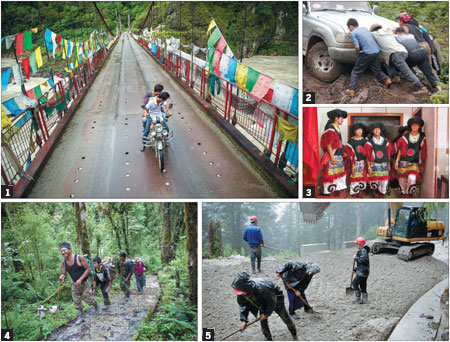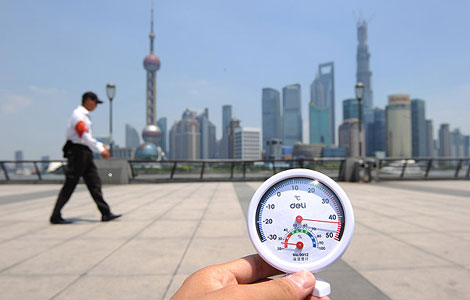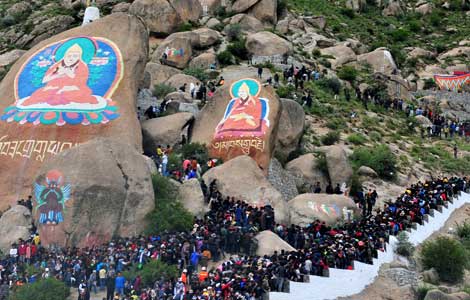County linked at last with outside world
Updated: 2013-08-07 07:25
By Wang Huazhong, Liu Xiangrui and Daqiong (China Daily)
|
||||||||
|
1. A motorcyclist and passenger ride across the bridge over the Yarlung Zangbo River in Dexing township of Medog county in the Tibet autonomous region. 2. People try to free a car stuck in the mud. 3. Young men of the Monba ethnic group prepare for a traditional dance performance. 4. People still have to carry their daily necessities to Medog when the road is flooded by heavy rain. 5. Workers repair damaged sections of the Zhamog-Medog road. Mud and landslides occur frequently from April to November. Photos by Kuang Linhua / China Daily |
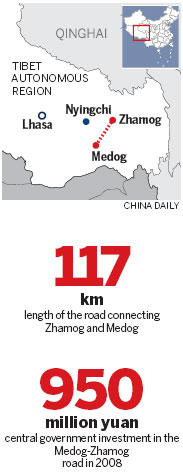
Road provides a lifeline and lifts hopes for locals, Wang Huazhong, Liu Xiangrui and Daqiong report in Medog county, Tibet.
Few people understand the importance of roads better than the residents of Medog county in the Tibet autonomous region.
Nestled below the snowcapped peaks of the Himalayas and with the raging Yarlung Zangbo River running through it, the county is the last in China to be connected to the outside world by paved road. The Zhamog-Medog motorway is now fully operational, but only seasonally.
The road starts high in the frigid mountains at an elevation of more than 4,300 meters, before dropping sharply to the tropical atmosphere of the county seat, which sits at 1,100 meters.
Before 2010, the first 80 km section was closed in winter because of heavy snow and frequent avalanches. However, the second 37 km stretch was closed in summer because heavy rains often caused landslides. When one section was closed, goods were stored at a warehouse between them.
Both sections are now open at the same time for about eight months of the year.
The county did not have a post office until 2009, or an electronic appliances store until 2010. An ATM, and business administration and taxation bureaus, arrived in 2011. There is, as yet, no bus station.
The road, constructed against a backdrop of constant challenges, has not only brought to an end the traditional method of carrying goods into Medog, by foot or on horseback, but also, and more importantly, has brought hope to local people.
"From age 12, I used to spend eight days with my family carrying salt, oil and cloth to Medog from the adjoining county," said 71-year-old Sangye Dorje, a member of the Monba ethnic group and a qualified medical practitioner.
"Once, my companions became snow-blind. I took care of them, even though I had no shoes. Look at my rotten feet and upturned toenails. What would we have done if we hadn't built the road?
The central and local governments have been trying to make Medog accessible for several decades. In 2008, the State Council invested 950 million yuan ($139 million at the time) to upgrade the road. At the end of 2010, a tunnel was bored through Galung La Mountain, meaning the road is now passable eight months of the year.
The recent developments in the transport infrastructure have also spurred the local economy to the extent that in 2012 Medog generated GDP of 240 million yuan ($39 million), almost three times more than in 2008.
The same year saw the county attract the largest volume of inward investment among all the counties in Nyingchi, paying 138 million yuan in taxes, a rise of 452 percent from 2011.
"Without the road, everything is empty talk. Only when a road exists, can we realize our dreams," said Liu Gesheng, the former Party head of Medog.
"Medog is turning from an isolated island into a land of opportunity," he said
The 'elusive lotus'
Medog, which sits on the border with India, means "elusive lotus" in the Tibetan language. It is said that Padmasambhava, a guru who is also known as the Second Buddha, practiced in the county and spread the word. The sutra Kangyur describes Medog as "the most exceptional and blissful among holy sites" and explains that the county has an endless supply of food and holds the golden key to the blissful land.
Despite that praise, the lives of the local people haven't always been as rich as those described in the sutras.
The county annals show that until 1951 Medog was under the administration of the Sera Monastery, about 500 km away in Lhasa, meaning that residents were forced to pay tributes, including food, dyed goods and animal skins, to the monastery's deputies.
Locals had to walk through the tropical forests of Beibeng village (elevation 600 m) and pass over mountain peaks, such as the 4,200-m-high Doxong La Mountain, to hand over their tributes in the adjoining county of Mainling.
The 100-km tribute route, dubbed the "Monkey Pass" by locals, took 15 days to traverse on foot. It was no cakewalk; the bridges were simple chain devices and footholds in the cliffs were made by driving pieces of wood into crevices.
From 1962 to 1964, locals and soldiers worked to expand the pass into a 1-m-wide horse track, shortening the journey time to eight days. At the time, however, few locals could afford to own a horse.
"Everyone was in a jubilant mood and drank to celebrate having such a good road," said Sangye Dorje, who, in addition to his medical duties, is also a co-author of the county annals.
At the end of the 1960s, a transit station for goods was established at Paizhen township in Mainling. It was open from July to September every year and used exclusively by the people of Medog.
County specialties, such as bamboo handiwork, dried chili peppers and dyed goods were shipped to the station, or "swap shop" as the locals called it, ready to be exchanged for necessities such as cloth, salt and ironware.
"It (the station) had such a variety of soft cloth that I'd never seen before; black, blue, white and yellow," said Sangye Dorje.
"The people of Medog owned just a single set of clothes, which they wore during the day and used as bedclothes at night. Some locals worked for a month at the tailor's workshop to afford a set of clothes, but those who didn't sometimes wore animal skins" he explained.
The lowland sections of the Monkey Pass were plagued by leeches and malaria-carrying mosquitoes, and the trail was constantly damaged by mudslides and collapses.
Meanwhile, avalanches were frequent on highland sections of the route, especially on Doxong La Mountain. It's one of a number of peaks on the pass that the locals say are made up of the piled bones of the thousands who have died attempting to cross them.
"My father was an optimist. He thought that because the horse pass was there, life had already improved greatly," said Sangye Dorje.
No longer isolated
Starting in 1975, construction teams and soldiers began building a frontier defense road to link Zhamog township in Bomi county with Medog. The road was the precursor of the Zhamog-Medog motorway, but when it had extended 108 km from Zhamog, the project was terminated in 1981 after the central government ordered Han officials to be transferred from Tibet.
According to Li Wei, head of the Medog traffic bureau, the building of the Zhamog-Medog motorway returned to the government agenda in 1988 as part of China's reform and opening-up policy.
Finally, in 1993, the first vehicle, a Chinese-made truck, drove into Medog, indicating that the "elusive lotus" was no longer isolated. Curiously, the truck never left and was abandoned at the northeastern corner of the county's Lotus Square.
The arrival of the truck was a one-off event, though, and in the decade that followed no other vehicles made their way into Medog because extreme weather conditions and geological hazards made the road impassable, according to local officials.
Although State and local governments allocated funds to repair the road and the locals participated in the work, the area's unstable geology caused endless problems.
"Experts from the Ministry of Transport, who conducted a survey on the road in recent years, discovered a complex web of geological problems, including unstable mountains, mud and landslides and collapses," said Li.
"The region has very rich waters and gets lots of precipitation, which also causes instability."
Locals continued shipping their goods and the road has been passable, if only seasonally, since 2000 when a transit station, named 80K after its location 80 km from Zhamog township, was established and put into operation.
The station divides the road into two parts. The first section from Zhamog to 80K is only passable from July to September when the heavy snows are either melting or just beginning to fall.
The second section, from 80K to Medog, is closed to traffic from April to November, a period of heavy rains when landslides, mudslides and collapses frequently occur. These natural restrictions mean that goods must be stored at 80K during the summer, awaiting shipment to Medog from November to March.
The situation had not changed by 2008, when the State Council invested 950 million yuan to upgrade the road and bored the Galung La Tunnel.
Now, said Li, the road has made history by being open for more than a year (from April 2012 until now).
"I have to admit that conditions played a large part in the success, which depended on one hand on the hard work and determination of the local people and on the others on favorable weather," said Li.
The road has received annual maintenance subsidies of 3.6 million yuan from the government of the autonomous region since 2007.
Flowering lotus
Like many other farmers in the area, Tsering Tenzin, 61, used to grow radishes, wax gourds, pumpkin, eggplants and red peppers. These were the only vegetables he cultivated until the opening of the Galung La Tunnel road changed his habits.
"It rains a lot here. Vegetable roots rot easily after soaking in the excessive water. Leaves are quickly consumed by bugs, too," he said. "We can coax all kinds of taste and flavors out of a very limited range of vegetables. Whenever the road was blocked, very few people could afford the vegetables that were shipped in on horseback."
The elderly farmer recalled the year 2000, when a landslide blocked the Yarlung Zangbo River, raising the water level by 30 m and destroying all the small bridges and paths.
In the following months, local businessmen organized porters to carry cabbages from the adjoining county, where they fetched about 1.6 yuan per kg, to sell in Medog at 26 yuan.
"Tomatoes cost 50 yuan per kg, which sounds unimaginable in inland China, but the price was reasonable at such a time and in such a place," said Tsering Tenzin.
The official records show that the local farmers and herdsmen made an average annual income of 2,623 yuan in 2008.
Even in the 1990s and early 2000s, people rushed to buy vegetables as quickly as they could and the supply of pork was even lower than in previous times of difficulty, according to butcher Zhang Zhijing, who moved to the county from Sichuan in 1988.
"You had to pre-order pork. When it arrived at the only market in the county, you had to quickly slice it yourself and pay later. Otherwise, the other people would leave nothing for you."
Medog has so few arable fields they only account for 0.08 percent of its total land.
Because the tunnel has extended the length of time during which the road is passable, large quantities of vegetables and vegetable seeds have been shipped in.
Since 2010, the local government has erected almost 100 houses made of plastic sheeting to fend off the rains and unwanted pests.
Specialists were sent to guide farmers in growing a variety of vegetables and even fruit, such as muskmelon that the locals had never seen before. "Looking at the melons growing larger, I feel delighted," said Tsering Tenzin.
Booming business
He's not the only one who has benefited from construction of the road.
Four years ago, as telecom companies exploited the accessibility provided by the road and began to initiate mobile services in the county, Duan Haiyan, 29, dug her first bucket of gold by selling obsolete mobile phones.
Two years ago, she started selling cosmetics. "Locals only used cream for protection against the winter winds in the old days. They didn't have any choice back then," she said.
In November 2010, Chen Xianxiu, 47, from Sichuan, opened Medog's first electronic appliances store and sold 300 washing machines in both 2011 and 2012.
Jikmey Dorje has developed his transport business, expanding from, literally, a one-horse operation in the 1980s to a tractor in 2000. He now owns and manages a fleet of 30 trucks.
The county government's review report described the period from 2008 to 2012 as "five years that broke the transportation shackles that had fettered the county's development".
Official figures show that the county's total road length increased from 148 km in 2008 to 263 km by 2012, including the 117-km Zhamog-Medog road.
"For generations, even in our wildest dreams we didn't dare think about having such a wonderful tunnel that went through the snow-covered mountains," said Jikmey Dorje.
"Life has improved a lot and I believe there will be even bigger changes in the future."
The upgrade is being aided by a cash injection of 3.3 billion yuan from 2011 to 2015 to consolidate and streamline the Zhamog-Medog road. The county will also invest millions of yuan to build roads to link county seats and villages.
Opening minds
Padma Dradul, a member of the Monba ethnic group and deputy Party head of Dexing village, believes the road has also opened people's minds.
"Before, few people wished to work outside or send their children to school. But, the mindset has changed along with the road. People know that Medog has lagged behind and we won't catch up if we don't study."
The 30-year-old local graduated from the University of Tibet in 2005 and returned to Medog the same year.
Twenty years ago, the local primary school taught students for three years. Following that, aged about 8, the children had to leave their families and walk for four days to study at schools in the neighboring counties of Nyingchi prefecture.
"My first experience outside was overwhelming. There's a lot of good food out there; I like dumplings the most because I'd never tried them in Medog. You couldn't buy things, even a stick of gum, in Medog back then. It was practically empty and there wasn't even a shop," said Padma Dradul.
He said that because so few locals had ventured far from Medog their knowledge of the outside world was limited and that made them reluctant to send their children to school.
Since then, Medog has acquired the road and TV, and mobile phones allow the residents to access the Internet. All this has led members of the younger generation, such as Padma Dradul, to ask: "How can we bring change to Medog?"
"People used to think, 'I have my piece of land, so I won't starve if I keep working the farm', but now, they've seen the developments and have realized they can't keep living on subsidies," he said.
Although Dexing is self-sufficient in agricultural output, Padma Dradul is not satisfied that most of the village's income is based on manual labor. "Selling labor is not sustainable. We must move up the value chain," he said.
To that end, he took 29 villagers to Sichuan province in 2012 so they could learn the art of bamboo weaving, "It has high added value. We now plan to combine our ethnic influences with our weaving expertise and expand the business to a wider market. The road will lead our development."
Contact the writers at wanghuazhong@chinadaily.com.cn and daqiong@chinadaily.com.cn
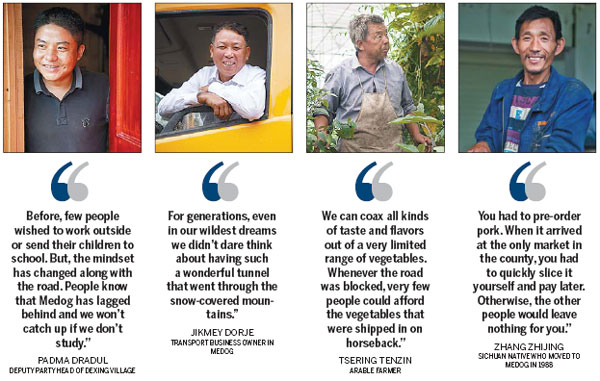
(China Daily USA 08/07/2013 page7)
Most Viewed
Editor's Picks

|

|

|

|

|

|
Today's Top News
China vows to severely punish newborn traffickers
Sri Lanka suspends NZ milk powder imports
PV firms face risks despite EU deal
Small firms should also think global
China issues record fines for dairy firms
US, China trade deficit narrows
NBA courts Sina Corp
EC denies delay in telecoms probes
US Weekly

|

|
